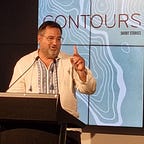Tracing Patterns — Kyiv Collage, March 27
Pushkin Pushed Out
More than 200 street names in Kyiv have been changed in recent months. It’s a de-Russification and de-Sovietisation. My ‘hood includes the recently renamed Yevhen Chykalenko Street. Chykalenko, who was active in the build-up to the first Ukrainian Republic during World War 1, was my kind of dude: patriot, writer, promoter of Ukrainian history and language, and benefactor.
The street used to be named for 19th century Russian writer Alexander Pushkin who the Soviet regime deified and used as a key figure in the Russification of Ukraine. Eg, the promotion of some myth of a greater Russian culture or ‘Ruskiy myr’. Pushkin wrote poems, for example, condemning Hetman Ivan Mazeppa for fighting Russian imperialism.
Indeed, the renaming of my street is part of what’s being called ‘Puskinopad’ here — literally the ‘fall of Pushkin’. Dozens of his statues and other places about him have been demolished etc since the start of the full-scale invasion.
Flower Fest
Ukrainians have a remarkably strong connection to the land and to growing stuff. It’s like the national hobby is: see dirt — plant something. All over, Kyiv people are right now digging up little plots of soil and putting down seeds for the spring. Like outside the café near my workplace at the Kyiv Post in the middle of a very urban area.
And, perennials are starting to peak out at Taras Shevchenko Park.
When people get flowers from family and friends at restaurants for their birthdays, they ask the wait staff for a vase. They come out instantly. On Sunday nights, I see soliders with their girls outside Metro stations, going back to their duty stations. There’s always a bouquet. These are all blooming messages of beauty and hope.
This love of flowers, I love. A local photographer and I will be doing a piece where we try to track flowers from their farms to wholesale markets to flower sellers to recipients. Zoya Shu is remarkably talented and I can’t wait for that, as well as other projects on social issues in Ukraine.
It’s Not Weak to Speak
Ukraine has been a conservative place when it comes to mental health issues. Centuries of stoicism, small town ways, religious beliefs — layered over by the Soviet system which used psychiatry as part of sentencing patriots and dissidents, and simple scribblers not unlike me.
The stigmas are fast coming off during the full-scale invasion. Because people are in pain and they need the help. The bus stops of Kyiv feature posters for services such as: mental health counselling, domestic violence intervention, and veterans’ support. It seems that war may just be making this a kinder place too — or at least one where support does not have to be solely family or faith based.
One of the vital services is Lifeline Ukraine, which I’ve long been affiliated with. Under my friend Paul Niland’s leadership, it’s now answering some 3000 calls per month as opposed to 1000 prior to invasion. They can always use your financial help as they save Ukrainian lives.
It was also an honour to catch up with Capt. Andriy Karachevsky, the former President of the Ukrainian Psychologists’ Association and now a serving officer. When we worked together at the Ministry of Health, Andriy was instrumental in developing mental health and suicide prevention policy, including Lifeline. Another fine man doing incredible things for his country. Article soon in the Kyiv Post.
Sunday at the Opera: More Rockets Equals More Concerts
My Kyiv-based cousin and I caught a performance of the opera “Yaroslaw Mudriy” (Yaroslaw the Wise) about one of Ukraine / Rus’ great kings. It was phenomenal — not only the singing, but elaborate costuming, choreography, staging and orchestral work — especially considering war-time conditions. A friend at the paper likes to laugh: “More rockets equals more concerts”.
This particular opera was composed in the 70s and banned pretty quickly after some initial performances. Why? Because it refers to Ukraine as a Christian country; it talks about Ukraine standing between the hordes and Europe (sound familiar); it depicts a fully fledged Ukrainian state and society when Moscow was still a mud puddle (to quote my Aussie mate, Mark Textor).
Now, its back in full glory as art is so important to keeping Ukrainians sane and motivated in these times. Wise indeed.
Parallel Reality
As you can tell from above, Kyiv is very different from Kreminna or Kramatorsk right now. Between performances, hipster cafes, mod fashion and so many other very positive features, it’s a bit of a planet apart from much of Ukraine. The planet comes back into the solar system with sirens and missile attacks, of course.
But, it reminds me not to stay too comfortable for too long here in the capital. I’m hopeful of being back out in the field soon, including to cover stories like Australian military and civilian aid to Ukraine. It’s about giving voice to people doing incredible things in the name of values that we sometimes sleep-walk our way through.
